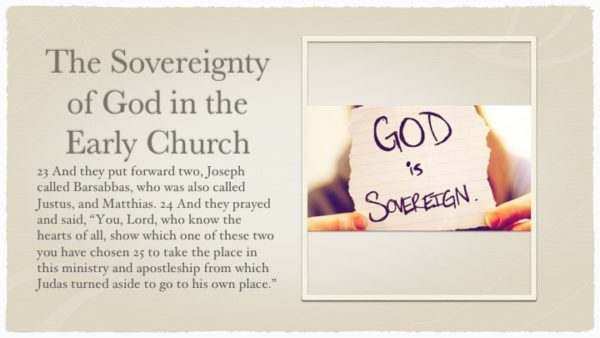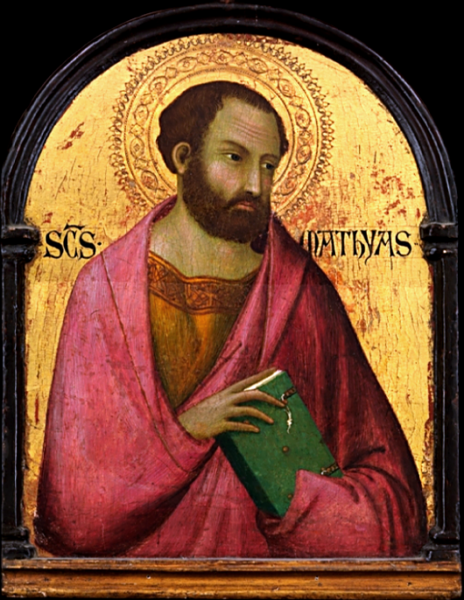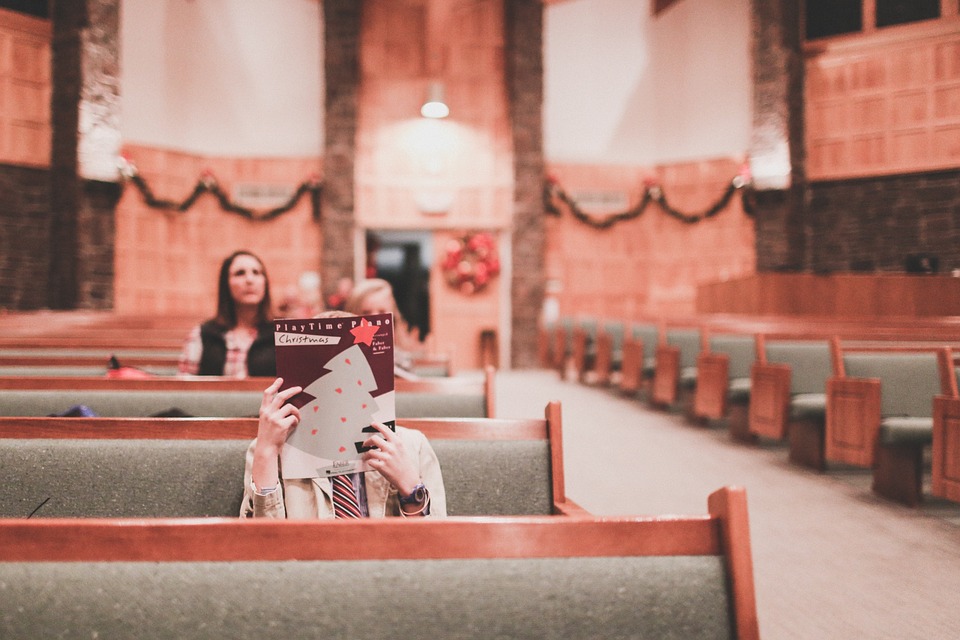Pastor Dan finishes his sermon discussing the sovereignty of God in the early church, before going on to explain the critical difference between ‘being’ the church and ‘going’ to church.

Relying on the Sovereignty of God
I can’t say enough good about this part of the passage. They prayed, “You Lord, know the hearts of all. Please be kind to us and show us which of these two you have chosen.” Two were put forward and it is without any doubt in my mind that God had chosen them in His providence as well. There was no guess work in any of this. The apostles were not getting out in front of God, as some have suggested, by not waiting on Paul to fill this spot. This was not willfulness on their part, and it is evident in their prayers for this decision.
“You Lord, know who you would have to serve.” There was not a shred of disobedience or acting in a self serving manner anywhere in these actions. They were fully relying on God to steer the ship here.
They were relying on the sovereignty of God in this and every other decision they were making. This is why Luke was careful to mention that they prayed as much as they did. They weren’t feeling their way along in the dark. God was faithful to direct. He was faithful to intervene on their behalf.

And they cast lots for them, and the lot fell on Matthias, and he was numbered with the eleven apostles. Acts 1:26
This lot that was cast was likely a very early type of dice throwing. In the Old Testament, they called it the Urim and Thummim. Now, anything I could tell you about this procedure is more or less conjecture. Scholars have a number of ideas about what this could look like and how the process went. But suffice it to say, for now, that there was some method that was used. All the way through the Old Testament, these stones were a reliable way to discern the will of God in an important decision. This Urim and Thummim method is just as likely to have been used as anything else. They may have drawn a name out of a container for all we know. The end result is that God chose Matthias from the two.
The Choosing of St. Matthias

Matthias holds the distinction of not having a single other thing said about him after his name appears here. His story, according to tradition, ends in martyrdom after a period of faithfulness to be the witness to the resurrection that he was called to be. But we don’t know anything else about him really. However, it is important that we don’t lose the point of all of this in the smaller details or lack thereof.
[box] The point is that the church had begun, in a very simple straightforward fashion. It was not flashy. There were not giant signs outside announcing free balloons for the kiddos. There was not a popcorn machine set up, there was no potluck probably. There was very simply unity, purpose, prayer, and the genuine seeking of God’s sovereign will in their daily affairs.[/box]
It all points to a simplicity, an authenticity, and an urgency which is admirable–even, dare I say, enviable.

One quote I read this week about this passage said:
“These Christians understood the gigantic difference between going to church and being the church.”
Being the Church vs. Going to Church
The vast majority in our American culture view the church as something consumable. We really can’t fault them for this, because this is what is taught. This is what is to be expected. Here is what I mean by that.
A family looking for a new church home for whatever reason will begin the process of visiting the various churches around. All of this will be done with one thing in mind, many times at least–Does it meet our needs?

The family will have a checklist of needs. This list may include a youth group, or certain Sunday school offerings. It may mean a big choir that they can sing in, or a very good band that plays loudly. The list may include a pastor who speaks in a very polished fashion about things that are important to them as a family and again, this is normal. It is expected. We can’t fault these people. This is what we are presenting them with for the most part.
[box] But it is missing something essential. That building, the leadership that works in that building, and the programs that the building houses are not the church. The book of Acts says that Christ purchased the church with his own blood. [/box]
Christ didn’t purchase any buildings. If he had bought a building, he probably would have started with a house for himself because he was homeless.
We are the church. If we are faced with the unenviable task of finding another church location because we’ve moved (Heaven forbid that happens to any of you, but if it did), I would hope that you would go in with the mindset of, “How can I be a blessing to this group of folks?” I wouldn’t want you to be thinking, “How do these folks meet my needs?”
[box] Are you being the church this morning? Are you unified with those here? Are you faithful? Are you prayerful? Do you share a common goal with this group of people here to be a witness of the resurrection? It’s not a very big list–this list of the things which constitutes a true church[/box] .
Again we will see what that is, in its fullness, in the weeks to come, as we study Acts 2.
We have people here in this place that share these things — Are you a part of that group of people? Or are you that piece of charcoal that is off to itself and dying out?

What Makes an Institution Timeless and Authentic?
There was a game invented around 1840 in our country in the state of New York. It was the game of baseball. The appeal of baseball is greater than ever before in our day and time. I think part of the reason for this is because it never left its roots. The game is still played much the same as when it burst on the scene in the 1800’s. The same cannot be said of other even more ancient games.
While the modern day game of golf was invented in the 15th century, the equipment that it is played with now does not even resemble that of the old days. Where they used to play with leather balls, and wooden shafts, the modern clubs now boast proprietary cutting-edge materials. The balls nowadays are made of who knows what–something secret. Where a good shot in the old days may have been 200 yards, pros these days are regularly hitting the ball nearly twice that far. Dustin Johnson has recorded a 430 yard drive in regulation play this year! If you know anything about the game. That is pure beast mode.

One of the endearing things about the game of baseball is that the equipment is essentially the same as it has always been and that equipment has a certain appeal to it. They play this game on a field of grass and dirt. The bat is made of a hard wood. No metal bats are allowed in the major leagues. Their gloves to field the ball are made out of leather. So is the baseball. Except for the catcher, the players wear a cotton uniform with a cap that looks pretty much like it always has. Everything in the game is natural and old fashioned in its composition. There is an authenticity to baseball that has caused it to remain — to endure.

Likewise, I believe there is a certain something about the early church and their way of doing things, that is appealing. It is compelling in its simplicity, its authenticity, and its singularity of purpose. Much like baseball, I think you can find, if you look for it, the Church, in pockets, that is much like it has always existed–dwelling in unity, in faithfulness to the original commands of the Lord, and in obedience to his Word.
Read More:
The Faithfulness of the Early Church Apostles
Watch the full sermon below.
Posted by Koinonia Church on Sunday, July 8, 2018
[author] [author_image timthumb=’on’]https://koinoniachurch.info/wp-content/uploads/2017/02/Pastor-Dan.jpeg[/author_image] [author_info] Pastor Dan Woody is a founding elder for Koinonia. He has been serving churches as a pastor for the past 13 years. He and his wife Peggy are the parents of two sons, Chris and Jonathan. Pastor Dan is currently studying for his Mdiv with The North American Reformed Seminary. His interests include music, and most outdoor sports like golf, hiking, tennis and fishing. [/author_info] [/author]
